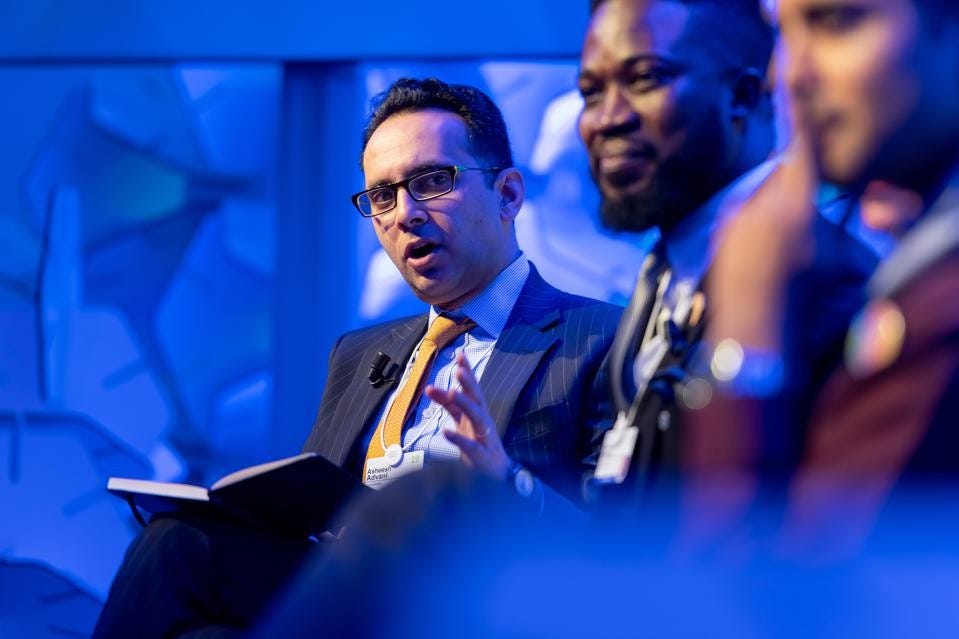Week 22.36 The Present
This past weekend I had the luxury of going to a mindfulness retreat in the Connecticut woods to explore how to live in relationship with ourselves, each other, and the planet. It was an eclectically curated group that included musicians, artists, entrepreneurs, teachers, and coaches. I met Alex, a retired professional athlete who is now an elite trainer of executives' mental toughness. Alex shared a powerful framing. His delivery, definitive and assertive, reminded me of other athletes whose mental toughness was forged from a difficult childhood and the crucible of professional sport. Anxiety comes from fear associated with living in the undetermined future and depression comes from fear associated with living in the unchanging past. We find our fullest selves when we live in the present.
Kathryn Schulz defines regret as "the emotion we experience when we think that our present situation could be better or happier if we had done something different in the past." But it is important to remember that we cannot change what has already happened, and dwelling on it does not help us move forward. We can derive some meaning from the past by reframing it from something we regret to a lesson we learned. We can find gratitude for what we have learned from our past experiences and use that wisdom to make better decisions in the future.
The future is a direction, not a destination. We often have a false sense of certainty about what will happen in the future, but we rarely know. This can cause a lot of stress and anxiety since we are worried about situations that may never come to pass. It seems like society has trained us to be goal seekers; as Marshall says, “the great western disease is ‘I will be happy when…’” In the process of trying to get the best grades, win a trophy as best athlete, get into the best schools, and get hired for the best jobs, we are taught to set goals, work hard, and derive self-worth in achieving the outcome. Of course, there are also many other people seeking those same outcomes, and there are circumstances beyond our control in determining who ends up on top. When we are too focused on the outcome, we lose our ability to adapt to the inevitable obstacles and opportunities that arise as we progress and we give undue power and reverence to things over which we have no control.
The present is where life happens. In the present, we make the best choices we can as we learn from the past and establish our goals without clinging to the outcomes. Chasing outcomes carries a false promise that the result we seek is in our best interest and will result in maximum happiness. When we live in the present, we are able to enjoy the moment and appreciate all that is happening around us. We are also better able to make decisions since we have all the information we need at the time. This can be difficult when stress or anxiety gets in the way, but it is worth trying to stay in the present as much as possible, accept things as they are, and choose happiness regardless of the outcome.
Life and leadership in the fifth dimension focuses on relationships over transactions, which is where life becomes much more meaningful. Transactions involve doing something for someone else in order to get something in return while relationships involve giving value to others simply because they exist. In other words, when we focus on relationships, we are not looking for ways to take advantage of others or use them for our own benefit. Instead, we want to connect with them and support them because they matter to us and add meaning and value to our lives. This way of living focuses on the present and on our relationships with ourselves, others, and the world around us. We live in the present, learn from the past, and we aim for the future. It is a more holistic approach that takes into account the interconnectedness of all things. When we live in the fifth dimension, we are able to see the world more clearly and find happiness and contentment in the realization that the present is a gift.
Anti-Time Management: Reclaim Your Time and Revolutionize Your Results with the Power of Time Tipping a new book by Richie Norton
Find your motivation, prioritize your ideals, and create a flexible work-life lifestyle--no matter how busy or successful you are--with the Time Tipping Framework, today.Why Anti-Time Management? This book is the answer to the age-old question of "work-life balance" and what to do about it. Award-winning author Richie Norton brings you into the future with the power of Time Tipping, a philosophy that allows you to live and work wherever you want and enjoy financial freedom by prioritizing attention, not managing time. What would life look like today if you had already achieved what you wanted? Norton delivers a complete roadmap that shows you how to get your time back, how to change how you're paid, and how to protect and expand your time around your values with principles like: Project Stacking: How to single-task multiple, lucrative projects Work Syncing: How to bring work and life goals in concert, creating increasing space. Expert Sourcing: How to design your work around results, not means. From great personal loss, Norton shares how he and his family live with no regrets and how attention prioritization and time creation are learnable skills despite hardships. Anti-Time Management will help you be present for the people, projects, plans, and priorities that matter most. Like light through a prism, you can purposefully create asymmetrical results by making small, intentional decisions on one side of your life or work to create brilliant strobes of possibilities on the other.
3 Things You Think Make You An Authentic Leader That Actually Don’t (Rhett Power in Forbes)
Authenticity is considered an essential trait for modern business leaders, but being an authentic leader is often oversimplified to just being yourself. We’re told throughout our lives that being ourselves is the key to happiness and professional success, but amid the countless pressures managers face in a constantly changing business environment, the “just be yourself” (JBY) approach can actually lead to disastrous results. And yet, numerous studies show that authenticity is a professional advantage. Some would even say it’s “the gold standard for leadership.” The best leaders don’t just show up to work and “be themselves” to win over employees and overcome complex business challenges. It may sound paradoxical, but authentic leadership takes years to master and lots of deliberate practice. At the same time, it requires avoiding traps like the three above, which may appear to cultivate authenticity but actually do the opposite.
Decoding The Future Of Entrepreneurship Education (Alisa Cohn in Forbes)
After a 40-year decline, entrepreneurship is having a moment. The pandemic unleashed a massive set of shifts in the way people work, and pushed some would-be entrepreneurs to take the leap. This is only good news to Asheesh Advani, the CEO of JA (Junior Achievement) Worldwide, the 103-year-old iconic NGO that teaches millions of young people about entrepreneurship, work readiness, and financial health. Earlier this year JA was nominated for the Nobel Peace Prize and, for four years running, has been ranked among the world’s top-ten social-good organizations. JA Worldwide was also just listed among the top-100 Fast Company Best Workplaces for Innovators list. There’s so much we can do with technology that can make a real difference around the world—especially in the context of education—but some of those solutions won’t accommodate the millions of young people without access to the broadband or devices they need to participate. We’ve made both sides of the ed-tech equation (the proliferation of it and the need for lower-tech options) central to our strategic plan, but it’s still keeping me up at night.











